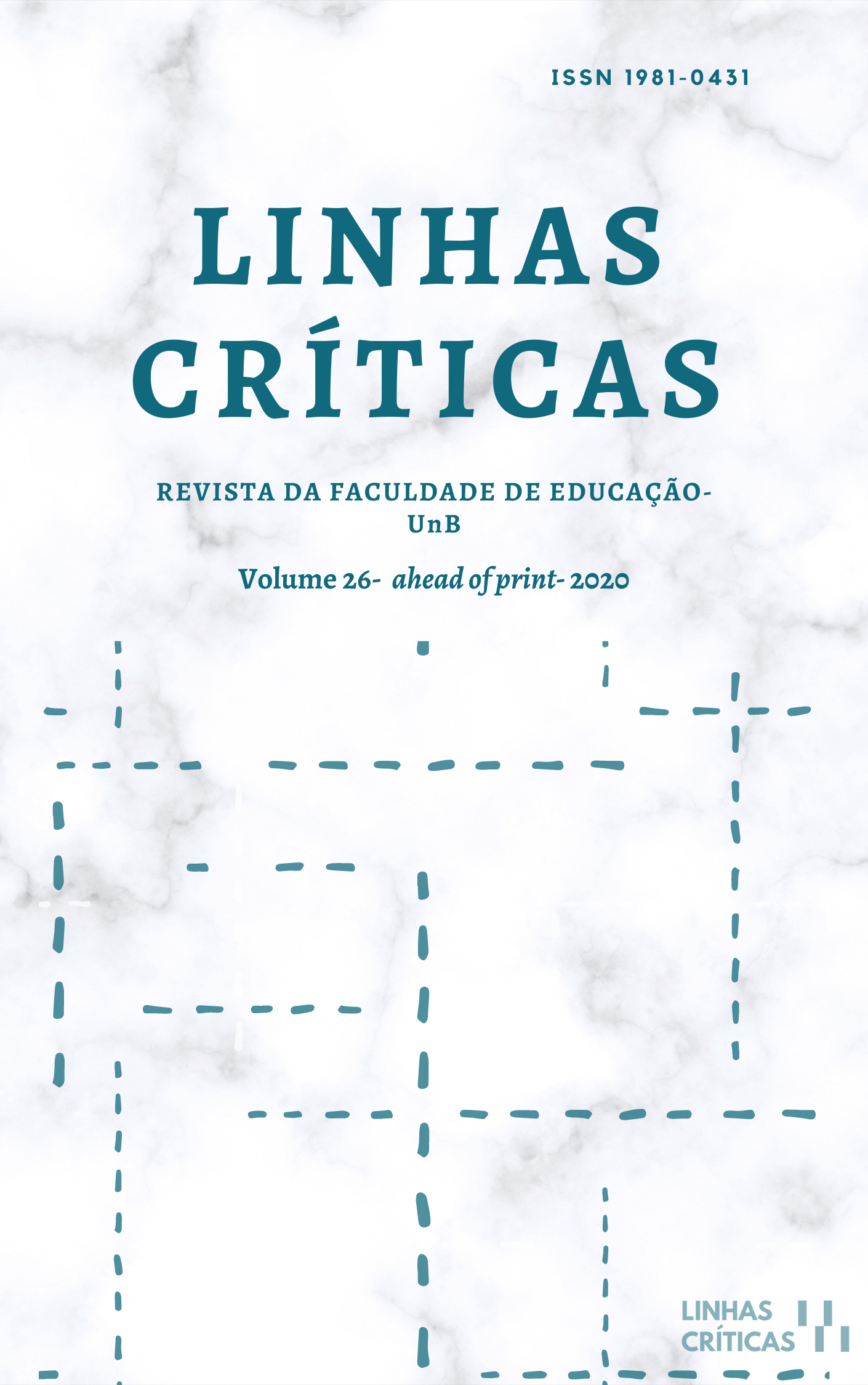Teaching knowledge for the Other in the role of the educator-bachelor in higher education
DOI:
https://doi.org/10.26512/lc.v26.2020.30573Keywords:
Teaching knowledge, Ethics of otherness, Educator-bachelorAbstract
This article aims to analyse the teacher’s knowledge articulated in the acting to the educator-bachelor, in the perspective of the ethics of the radical alterity. A qualitative and descriptive investigation articulated in the acting universe 37 educators-bachelor who work at a public university in the Brazilian Northeast. It was concluded that the constitution of the educator-bachelor for higher education needs to align itself with the teaching knowledge for the relationship between educator-teaching and an action that positions teaching at the heart of the educational process, through the appreciation of the teaching with their differences, needs, difficulties and yearnings.
Downloads
References
Almeida, M. I, & Pimenta, S. G. A. (2011). Construção da pedagogia universitária no âmbito da Universidade de São Paulo. In S. G. Pimenta, & M. I. Almeida. Pedagogia universitária: caminhos para a formação de professores (pp. 19-43). Cortez.
Alves, M. A., & Ghiggi, G. (2012). Educação como encontro inter-humano: da ética do diálogo à resposta ética pela alteridade. Revista Sul-Americana de Filosofia e Educação, 17, 59-77. https://doi.org/10.26512/resafe.v0i17.4450
Alves, R. (1980). Conversas com quem gosta de ensinar. Cortez.
Bardin, L. (2009). Análise de Conteúdo. Edições 70.
Barros, C. M. P. (2017). O lugar do educando (Outro) na formação e atuação do educador-bacharel-áltero(Eu). [dissertação de doutorado, Universidade Estadual do Ceará]. Repositório Institucional da UECE. http://siduece.uece.br/siduece/trabalhoAcademicoPublico.jsf?id=95219
Barros, C. M. P., Dias, A. M. I., & Freire, J. C. (2019). A atuação do educador-bacharel na perspectiva da ética da alteridade radical. Educação Unisinos, 23(4), 757-773. https://doi.org/10.4013/edu.2019.234.10
Cavalcanti, B. C. (2013). A entrevista compreensiva ou o elogio da pequena teoria. In J. Kaufmann. A entrevista compreensiva: um guia para pesquisa de campo (pp. 7-19). Vozes.
D’Ávila, C.M., & Leal, L.B. (2015). Docência universitária e formação de professores – saberes pedagógicos e constituição da profissionalidade docente. Linhas Críticas, 21(45), 467-485. https://doi.org/10.26512/lc.v21i45.4585
Freire, P. (1987). Pedagogia do oprimido. Paz e terra.
Freire, P. (1996). Pedagogia da autonomia: saberes necessários à prática educativa. Paz e Terra.
Gauthier, C., Martineau, S., & Desbiens, J. (2013). Por uma teoria da Pedagogia: pesquisas contemporâneas sobre o saber docente. Unijuí.
Kaufmann, J. (2013). A entrevista compreensiva: uma proposta para pesquisa de campo. Vozes.
Lévinas, E. (1980). Totalidade e infinito. Edicões 70.
Lévinas, E. (1982). Ética e Infinito. Edicões 70.
Lévinas, E. (1988). Ética e Infinito: diálogos com Philippe Nemo. Edicões 70.
Lévinas, E. (2010). Entre nós: ensaios sobre a alteridade. (Trad. Pergentino Pivatto et al. 5ª ed.). Vozes.
Martins, R. J., & Lepargneur, H. (2014). Introdução a Lévinas: pensar a ética no século XXI. Paulus.
Nóvoa, A. (2003). Profissão Professor. Porto Editora.
Oliveira, M. M. (2010). Como fazer pesquisa qualitativa. Vozes.
Pimenta, S.G. (2012). Formação de professores: identidade e saberes da docência. In S. Pimenta (Org.). Saberes pedagógicos e atividade docente (pp. 15-38). Cortez.
Pimenta, S.G., & Anastasiou, L. G. C. (2014). Docência no ensino superior. Cortez.
Saviani, D. (1996). Os saberes implicados na formação do educador. In M. A. Bicudo, & C. A. Silva Júnior (Orgs.). Formação do educador: dever do Estado, tarefa da Universidade (pp. 145-155). Unesp.
Souza, J. T. B. (1999). Emmanuel Lévinas: o homem e a obra. Revista SymposiuM, 3(2), 45-53. https://www.maxwell.vrac.puc-rio.br/2892/2892.PDF
Tardif, M. (2013). Saberes docentes e formação profissional. Vozes.
Published
How to Cite
Issue
Section
License
Copyright (c) 2020 Conceicão de Maria Pinheiro Barros, Ana Maria Iorio Dias, Jacques Therrien

This work is licensed under a Creative Commons Attribution 4.0 International License.
Authors who publish in this journal agree to the following terms:
-Authors maintains the copyright and grants the journal the right of first publication, the work being simultaneously licensed under the Creative Commons Attribution License which allows the sharing of the work with recognition of the authorship of the work and initial publication in this journal.
- Authors are authorized to enter into additional contracts separately, for non-exclusive distribution of the version of the work published in this journal (eg publish in institutional repository or as a book chapter), with acknowledgment of authorship and initial publication in this journal.
-Authorers are allowed and encouraged to publish and distribute their work online (eg in institutional repositories or on their personal page) at any point before or during the editorial process, as this can generate productive changes as well as increase the impact and the citation of published work (See The Effect of Free Access).



